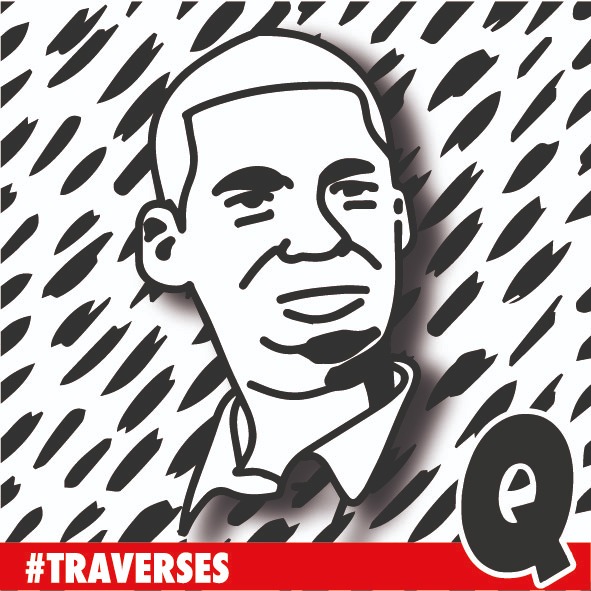In the Land of the Diallobé

This summer on the Fouta road, I took with me my copy of Rhapsodies rivers (The Walkabout, 2010), a collection by my brother, the poet Hamidou Sall, which he had given to me and signed in January 2011 in Paris . One morning last week, under a scorching heat that was suffocating Morphil Island, sitting on the banks of the river, I opened the book and came across this passage by chance, like a premonitory injunction to read: “I am from this river whose waters watered my childhood dreams. I am from this river whose alluvium had deposited, deep within me, this silt which had definitively entered the composition of my flesh. On my way, throughout this inner path which brings me back to the heart of myself, I have always summoned my memory in its river part to put it at the service of my dreams and my freely multiple identity.”
What touched me in the umpteenth reading of this passage is that this time I am in Saldé in the heart of the “Land of the Diallobé” brilliantly described by the patriarch Cheikh Hamidou Kane. This morning in this village famous for the figures who were born there and who wrote among the most beautiful pages of the political and intellectual history of our country, has something of the unvarnished praise of our people and the reminder of the special character of Senegal compared to the rest of the world. If the lineage started from somewhere between Sinthiou Diongui, Oualla and Diaranguel, it made a stop at Saldé and finally took up residence there, attended the Whites’ school and learned this « art of winning without being right. »
Pastef Didn’t Have Its Place in Our Democracy
In Saldé, it was with immense tenderness mixed with great pride that I saw the last traces of the house of Bineta Racine Alpha Kane, the Grand Royale, a character made famous by The Ambiguous Adventure. On the way back, we also come across the ruins of the former official house of Maam Aboubackry Kane, the youngest son of the Grand Royal, former parliamentarian and great figure of African socialism, as a reminder of the eternity of time which pass. What is the memory that we did not know? It is certainly a way of fully inserting yourself into a story that you have not experienced, in a time that is unknown to us, alongside characters who have disappeared. What is the trace? It is a bit like a palimpsest on which new stories are written every day in order to perpetuate an age-old tale. Baba Lamine Hamidou Kane, in his peaceful retirement, continues to preserve the heritage. He watches over what we halpulaar call the Gallé mawdo (the Big House). Nephew, son, father, cousin, he is the guardian of our temple populated with living souls and vivid memories. He welcomes, soothes and continues to write the story of the training of future elites in the humanities laboratory that is Saldé, particularly within the school now called Aboubackry Kane.
The Excesses of “Political Correctness”
But a morning in Saldé is hardly more than a moment, not that this village has recounted all the beautiful and tragic things it witnessed and which contributed to transforming the face of Senegal. But here, on the edge of Senegal and its Mauritanian twin, you have to have a Fulani soul, always on the road as Kerouac would say. We passed through Ngouye, the old commercial crossroads, before leaving through Pété, which Baba Aguibou Anne sings gently, the figure who has become a link, the respected and esteemed chef of Kawral Aanamɓe. We finally took the National, perfectly redone, to pass Thikite, land of origin of the family of Thierno Mamadou Saidou Ba, father of Thierno Amadou Tidiane Ba, the Sufi of Madina Gounas, before stopping at Sinthiou Diongui and to redo our seat.
Our ancestors left this small village stuck between Mboumba the proud and Pété the coquettish, to spread, light the “Dudal” everywhere, transmit the divine Word throughout Fouta as El Hadj Omar Tall had requested. This is how we have formed a line of Muslim scholars and intellectuals in French who are comfortable with the knowledge of the sensitive world but also in that of the world of shadows. Because, as Hamidou Sall reminds us in his Rhapsodies: “The mouth of the river opens onto a double cosmic cycle. It is the place of opening towards a vast civilizational elsewhere.”
The Path of the Stars
This beautiful country, which stretches between Walo and Diéry, bears the mark of a historical trace imbued with faith in God, worship of working the land, expression of all knowledge, openness towards all others elsewhere and confidence in the sacredness of the lineage. Very soon I will discuss the ancient wisdom on which this futanké lineage has built its entire history, allowing it to grow every day and share our values.
The marriages which brought countless branches and massive homonyms have enlarged this clan whose traces are visible in Podor, in Matam, in all corners of Senegal and even beyond our borders. But the sacred union holds thanks to faith, to the values of modesty, decency and thanks to these two bases that Kaaw Cheikh Fadel Dia describes well in his latest work Life was slow and tender (Présence Africaine, 2022): family solidarity and birth right. It is a poetry of living together which makes the relationship in the futanké country so beautiful. And as long as these sacred values are preserved and enriched by the generations of Yirlaabé, the prayer of their wise ancestor will never cease to guide their steps and light their path. (To be continued…)
Par Hamidou ANNE – hamidou.anne@lequotidien.sn

